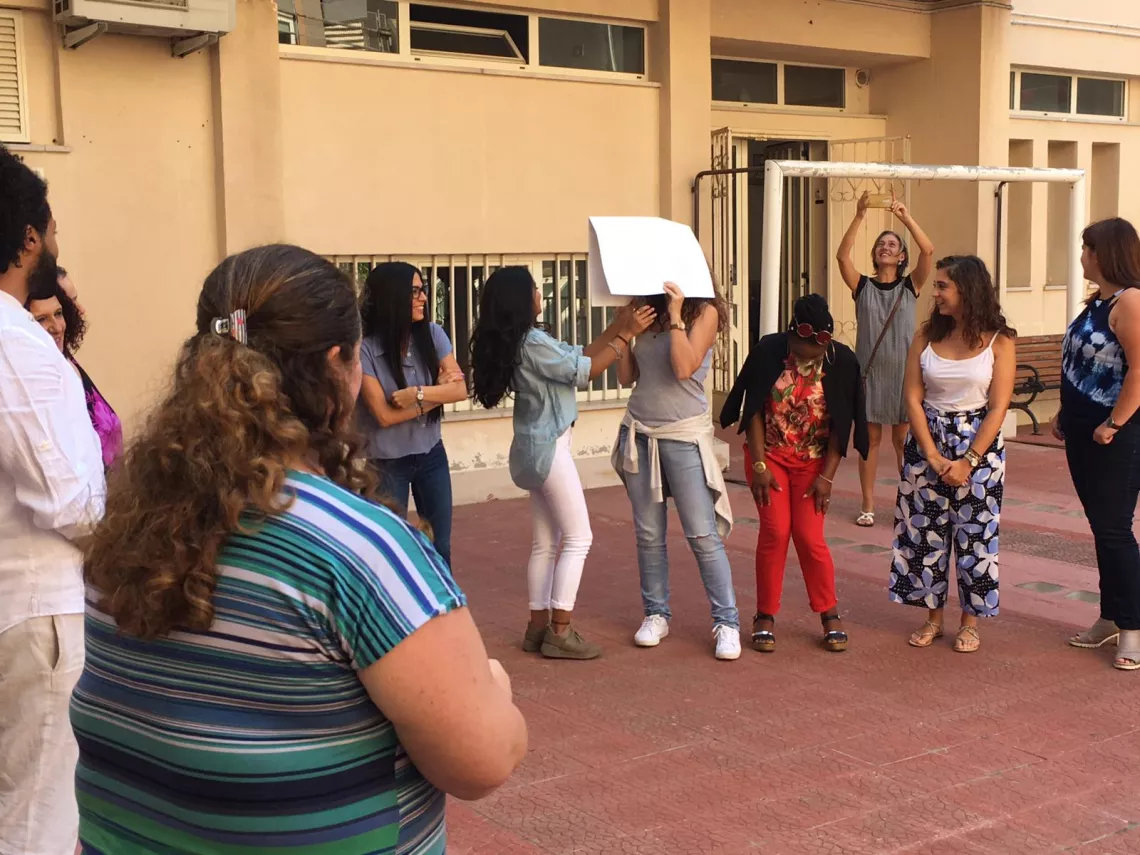Supporting survivors of violence
Helping cultural mediators to respond to refugees and migrants who have experienced violence

As a refugee, Ibrahim* knows well the difficulties and horrors of trying to reach Europe from Africa. Now a linguistic and cultural mediator living in Italy, he still remembers the brutality during the journey.
“The issue of gender-based violence has touched my personal experience particularly closely,” said Ibrahim. “During my trip to Europe, I witnessed many things. […] this topic has always been ‘forbidden’ for me, a kind of taboo on an emotional level that I didn't want to talk about or hear about.”
Linguistic cultural mediators (LCMs) are critical to the refugee and migrant response in Europe. They provide interpretation but also share information, offer support, and help refugees and migrants connect to services. They also play an essential role in helping survivors of violence, including women and girls who have suffered gender-based violence as well as men and boys who have been sexually victimized.
Highlighting the survivor-centered approach discussed during the training, Yana*, a linguistic cultural mediator working in Bulgaria, shared: “At our initial encounter with survivors of violence, we try to create a safe environment for them, to soothe their emotions in order to better address their fears and immediate needs. We [let] the survivor, if he or she wants, to disclose and to get support from us or to be referred to other professionals.”

“The presence of linguistic cultural mediators offers survivors [of violence] the opportunity to speak openly about their experiences and to be listened to and understood by the frontline workers who assist them in their path of care and social integration,” explained Ibrahim. “Cultural linguistic mediation is a necessary tool for survivors to have full access to their rights and recover the ability to rely on others because it makes dialogue and understanding possible.”
Despite widespread violence along the migration routes to Europe, survivors still face significant obstacles in accessing support services, due to poor referral networks, lack of information, and complicated systems of care. The limited number of linguistic cultural mediators trained in how to support survivors is also a key barrier.
To address this gap, the Women’s Refugee Commission and UNICEF developed a training curriculum to help linguistic cultural mediators effectively respond to and support refugees and migrants who disclose experiencing violence—including women, girls, men, boys, and LGBTI persons. The training aims to raise awareness about violence faced by persons of all genders along the migration routes and works to reduce harmful attitudes and misconceptions. It also underscores the importance of a survivor-centered approach.

An essential component of the training curriculum is self-care. Like Ibrahim, many LCMs have experienced or witnessed violence first-hand. They are also continuously exposed to stories of violence and suffering during the course of their work. Many reported experiencing stress, burnout, and vicarious traumatization. The training curriculum addresses the stressful nature of their work and provides practical exercises to manage stress.
“After I came back from the course, me [and another LCM who participated] showed and talked to the other colleagues about the new things that they learned in the course. There were new techniques to help keep the work moving,” said Hope*, an LCM in Italy.

“[...] In the office, we do not have time but we try to practice meditation at home to combat our high blood pressure. I divide my stress in two parts now, walking to release it from my body. Or I distract myself after work by playing video games or playing chess [...],” said Amir*, who participated in the training in Bulgaria.
The training curriculum was successfully piloted in Italy and Bulgaria in 2019 and 2020. It is currently being translated into other languages with the aim to be rolled out in other transit and destination countries in Europe. Although developed for the European context, the training has global application: it can be adapted and implemented in other refugee and migrant settings where linguistic cultural mediators operate. Partnerships are being strengthened to roll out the curriculum in other settings.

“The training actually, one step at a time, helped me to take a path on a personal level, allowing me to reach a point where I no longer felt so much anger,” said brahim, highlighting his biggest takeaway from the training. “Having participated, profoundly changed my attitude, and in this way had a great impact on my work. Since so many mediators have lived through difficult times like me, this kind of work becomes essential.”
*Name changed for privacy reasons
For UNICEF this initiative is part of the sub-regional program in Europe ‘Action Against Gender-Based Violence (GBV) Affecting Refugee and Migrant Women and Children in Greece, Italy, Serbia and Bulgaria’ implemented with the generous contribution from the Government of the United States.




